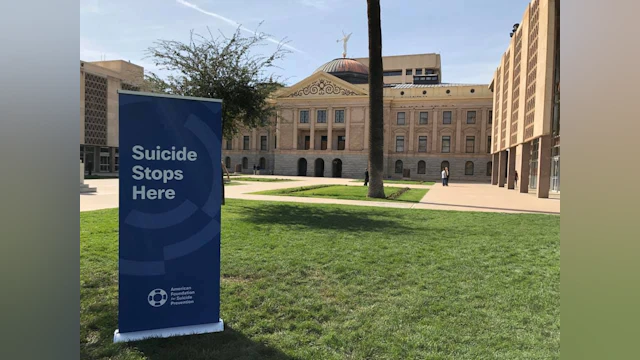Jun. 9, 2020 - At the end of one of my first ‘More Than Sad’ presentations – in which American Foundation for Suicide Prevention (AFSP) volunteers and staff, such as myself, teach students, parents and educators about teen depression – we took questions from the audience. A woman in the back of room raised her hand.
She asked about insurance and treatment. The frustration in her voice indicated that she knew the system quite well already. Her young son was struggling with serious challenges to his mental health, and it was a fight every day to keep him alive. Her private health insurance would no longer cover the healthcare her son needed. She and her husband were facing the heartbreaking prospect of having to relinquish custody of the child to the state so he could get the care he needed. It seemed he would receive better treatment on state insurance, which had much better options for mental health, than he would his parent’s private insurance.
They had tried everything and they were out of options. Red tape and a system that has long ignored the importance of mental health care had forced them to consider making an unthinkable choice. This would not be the first time I heard stories about the system failing those suffering from mental illness. The truth is that our system does not treat mental health and physical health in the same way.
Society would be in an uproar if a family was forced to give up a child who had cancer or a heart defect in order to provide the care they needed to stay alive. Why were we not in an uproar about this?
Mental health parity is one of AFSP’s public policy priorities. Simply put, mental health parity means that insurance companies and health plans must cover mental health care the same way they cover other medical care, without any extra restrictions for mental health conditions and substance use disorders.
After listening to this woman’s story at that meeting, I knew mental health parity was crucial to focus on as a Volunteer Field Advocate for my local AFSP chapter in Arizona.
In Arizona, Senate Bill 1523 and House Bill 2764 are collectively known as “Jake’s Law.” It is named for Ben and Denise Denslow’s son Jake, who took his own life at the age of 15, less than three months after insurers had declined a request for a longer inpatient stay. This, in spite of it being recommended by Jake’s doctors. The Denslow’s fully understand the urgent need for mental health parity. This is why they founded the JEM Foundation in 2016, in Jake’s memory.
If passed, “Jake’s Law” would change the way mental health care looked in the state of Arizona and set a whole new standard for states looking to pass parity legislation themselves. Among other provisions, Jake’s Law would expand youth access to behavioral health services in schools, establish a suicide mortality review team, and ensure that insurance plans offered in Arizona comply with existing federal mental health parity laws, requiring them to conduct and file an analysis with the state Department of Insurance demonstrating their compliance with these laws.
This would represent a massive change to our system, and I knew it was something we needed to support. I knew the AFSP Arizona Chapter could help amplify the importance of mental health parity and legislation like “Jake’s Law” by leveraging some of the resources and opportunities our chapter had already worked so hard to build. So, we decided to make “Jake’s Law” the primary focus at both our 2020 State Capitol Day event and at our inaugural Rally to Prevent Suicide in Arizona, on February 3rd.
The Rally to Prevent Suicide featured nine different speakers, including our State Suicide Prevention Coordinator, both the house and senate sponsors of “Jake’s Law,” Ben and Denise Denslow of the JEM Foundation, and our event sponsors. After the Rally, advocates met with their state senators and representatives to share their stories, and to urge them to support this critical piece of legislation that can save lives.
But our involvement did not end that day.
Our advocates continued to push for this legislation to pass. They made appointments to meet with senators and representatives. Working with the JEM Foundation, they held events to help get the word out to the community. They called, emailed, and sent letters. They showed up and waited hours to provide critical testimony during committee hearings.
And, on March 3rd many of our advocates were there as Governor Doug Ducey signed SB 1523/HB2764 into law. After passing unanimously in both the house and the senate – something virtually unheard of – “Jake’s Law” would be the law of the land and set a new standard for mental health parity nationwide.
As I stood there during the signing ceremony, it was easy to feel overwhelmed with the knowledge that this would positively impact so many in our state. There are countless people who helped in getting “Jake’s Law” passed, and as the AFSP Arizona Area Director I am truly honored that the Volunteer Field Advocates of AFSP’s Arizona Chapter could play our part.
To learn more about AFSP’s advocacy efforts and becoming a Volunteer Field Advocate in your own community, click here.
